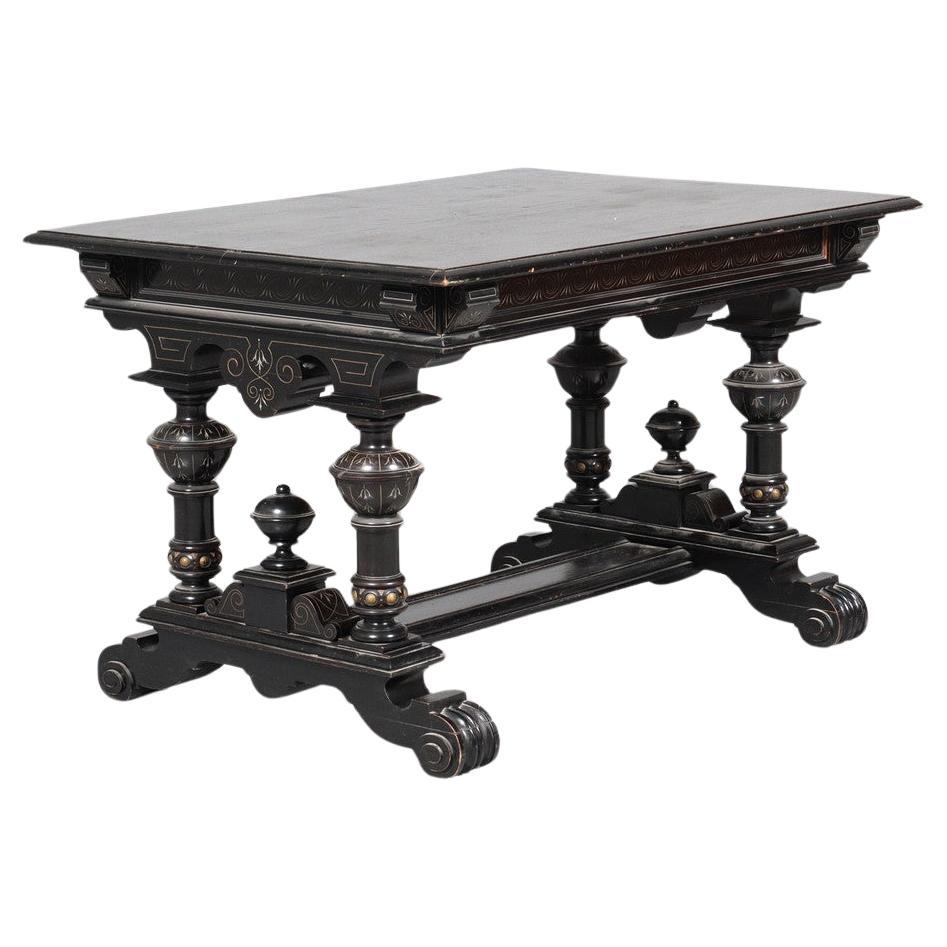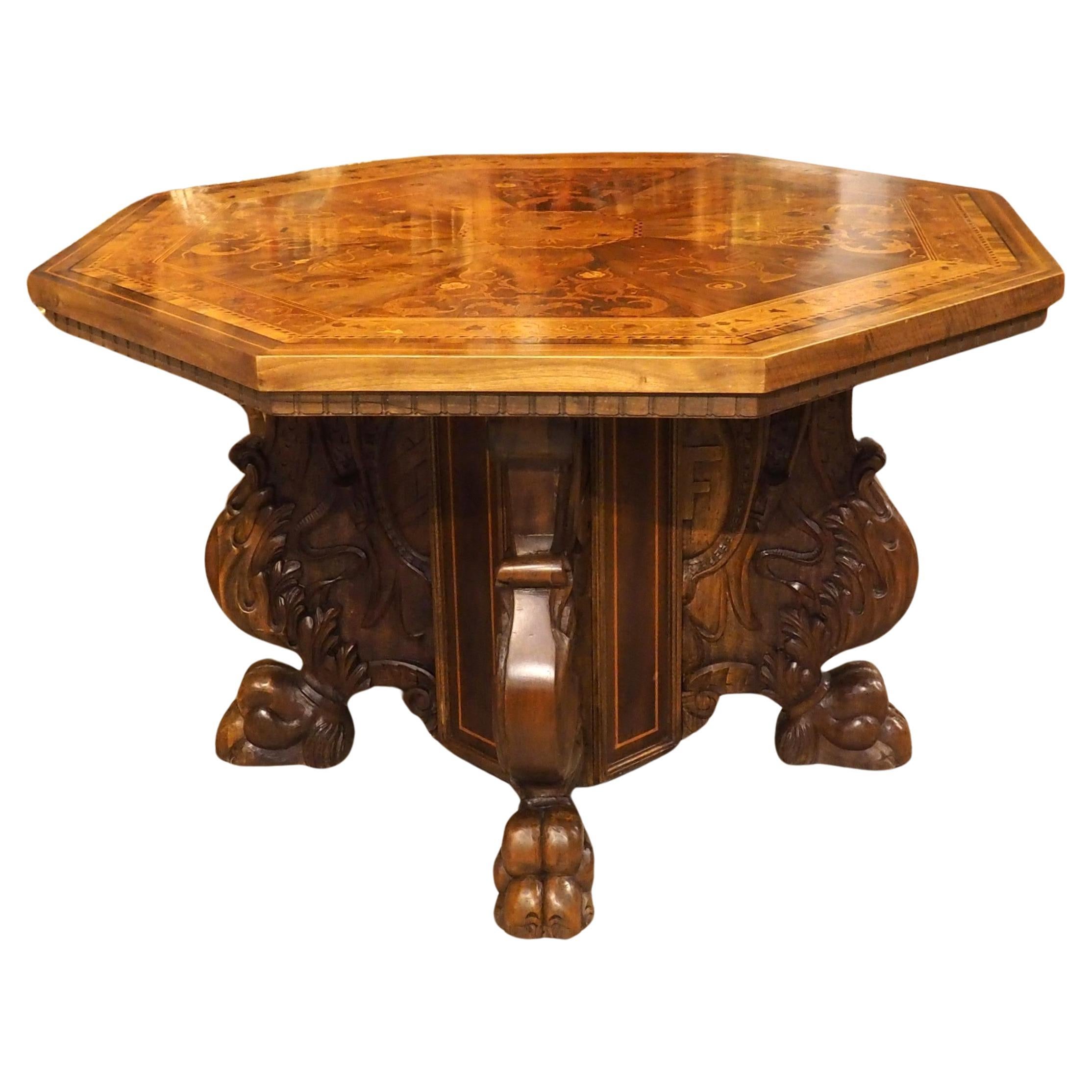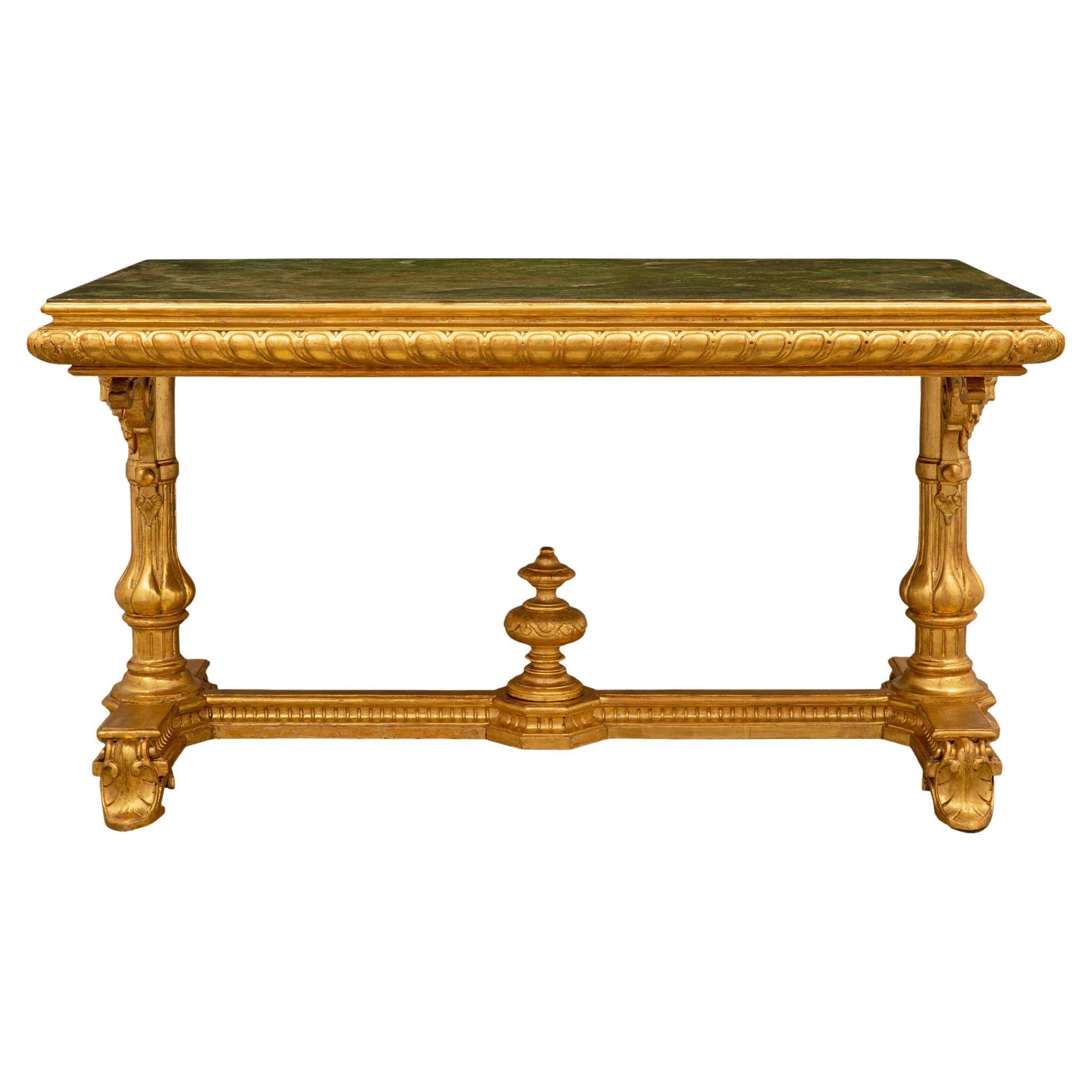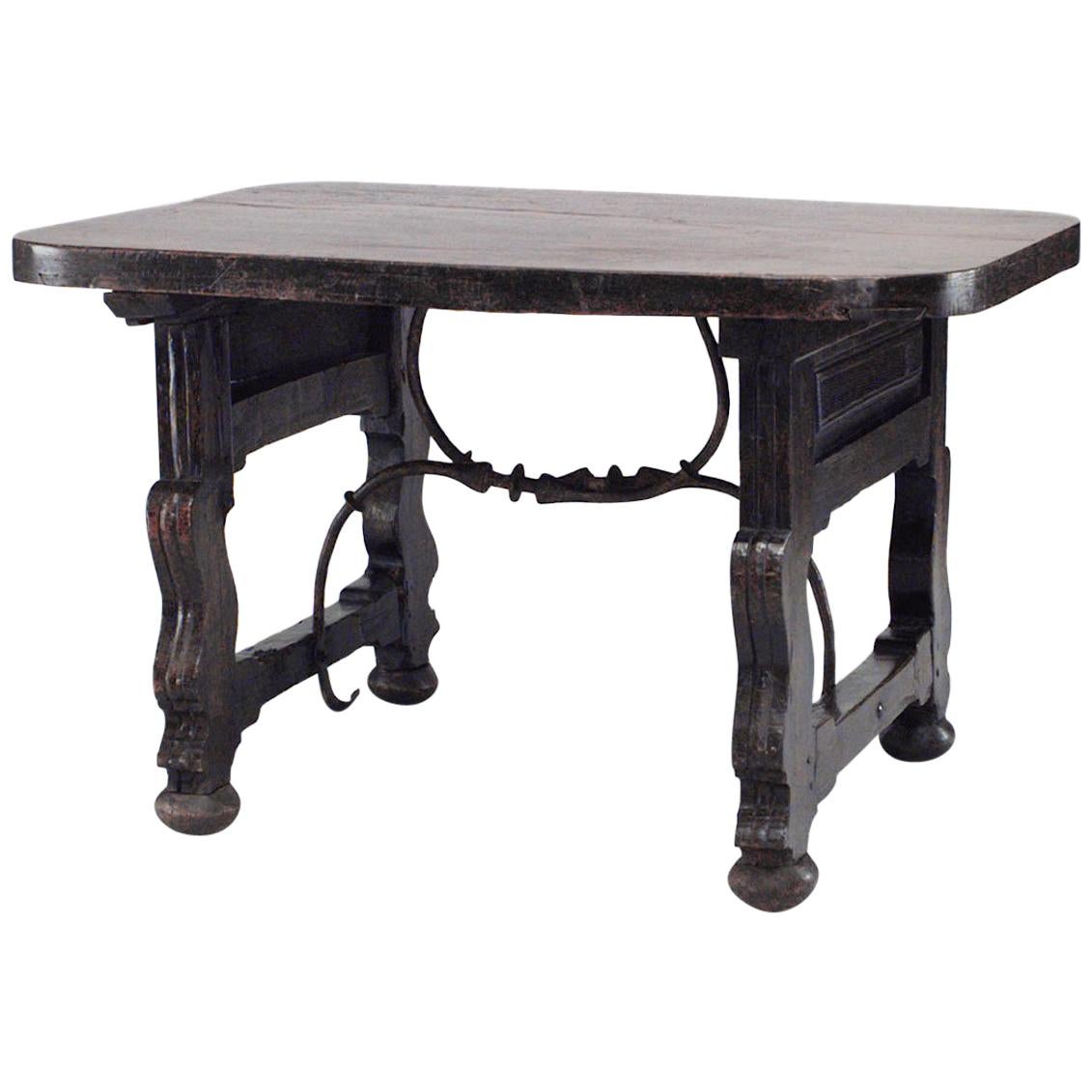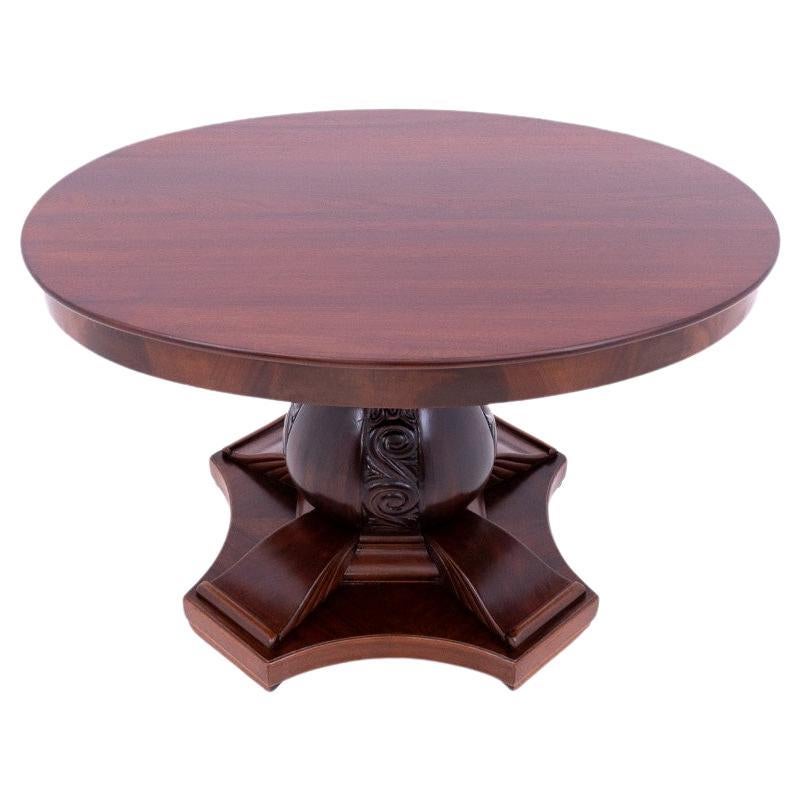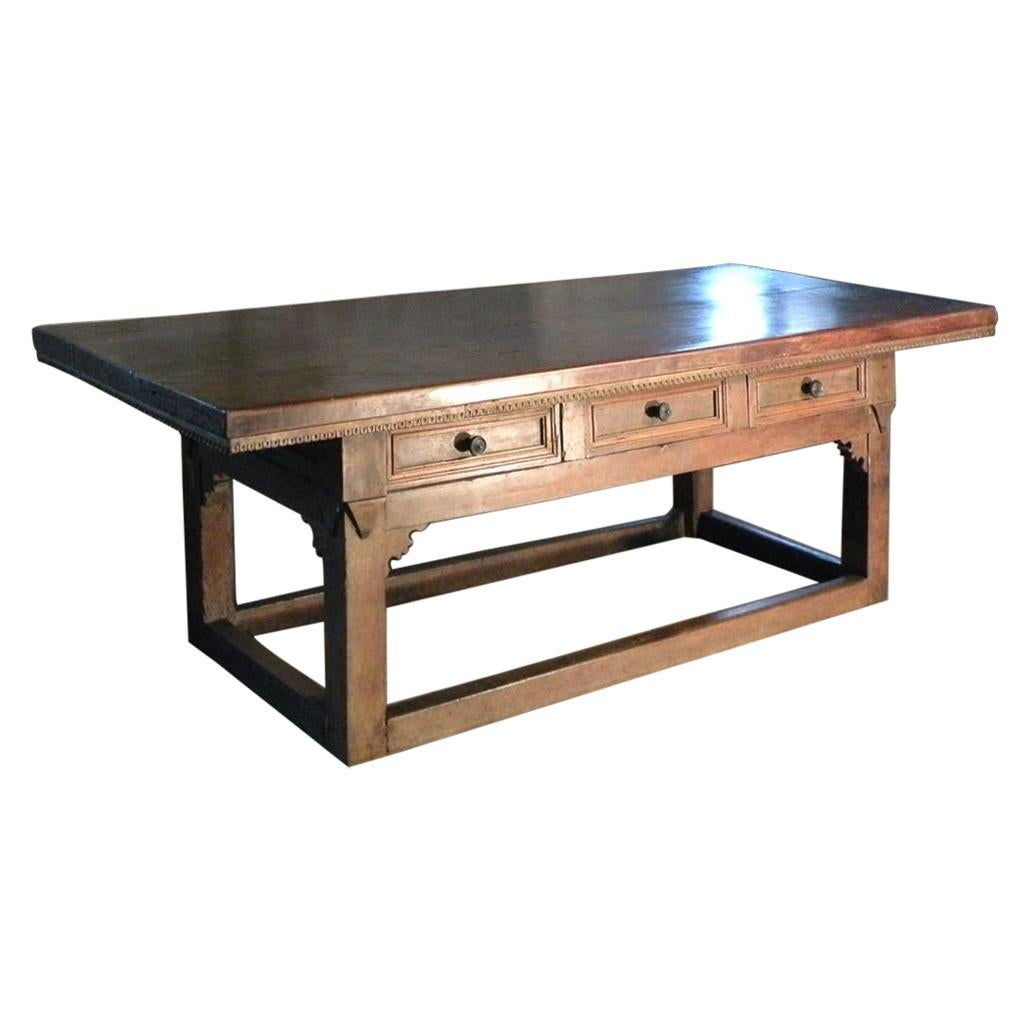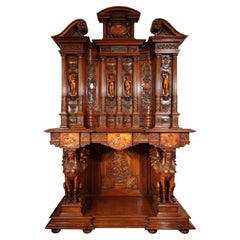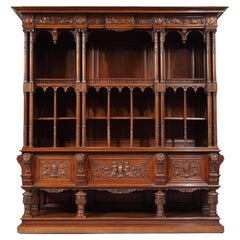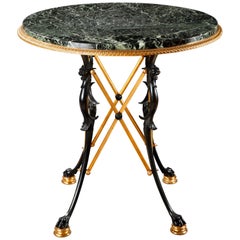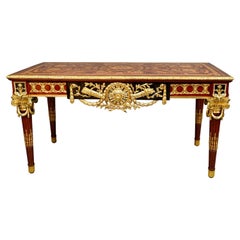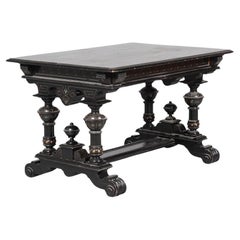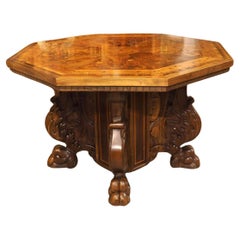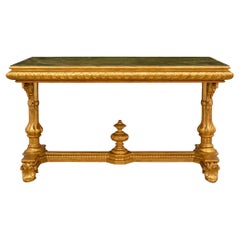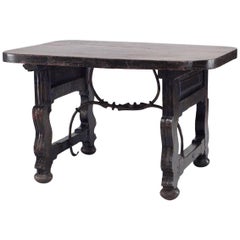Items Similar to Renaissance Style Center Table by Cortina D'Ampezzo, Italy, Circa 1890
Want more images or videos?
Request additional images or videos from the seller
1 of 7
Renaissance Style Center Table by Cortina D'Ampezzo, Italy, Circa 1890
About the Item
Label mentioning “I.R. Scuola, Sezione Intarsio e Intaglio, Cortina d’Ampezzo, n°146”
Exceptional Venetian Renaissance style center table. The top and the frieze opening with four drawers are fully ornamented with a flat carved decoration and a floral and geometric inlay according to the technique of Tarkashi. It rests on four architected legs joined by a stretcher.
Don Cipriano Pescosta (1815-1889) created in October 1846 in the small town of Cortina d’Ampezzo, Veneto, a school for the teaching of drawing. The institution was gradually gaining wide popularity for its courses in sculpture as well as in cabinet making. In 1874, the school became “State Industrial School” and in September 1876, they opened sections of wood inlay and mosaic. In 1881, John Coddington, President of the famous Oriental Club in London, which included British nobles and other gentlemen residing in Asia, made known to the Italian School a new technique, the Tarkashi, thanks to some objects brought from a trip to India. It was a technique of marquetry employing refined interlaced ribbons of various woods and sometimes decorated with ivory and mother of pearl. Artists and students of the Ampezzo art school, already skilled at woodworking, adopted this technique, which was successfully developped and even brought the fame to Cortina d’Ampezzo. In 1889, the school was open to women with sections of sewing, embroidery and lace. Cortina d’Ampezzo School was awarded a silver medal in 1893 at the Regional Exhibition of Innsbruck in Austria. They then sold all of the exhibited pieces, including a large part to the German Darmstadt and Stuttgart museums.
- Creator:Applied Arts School of Cortina d'Ampezzo (Maker)
- Dimensions:Height: 30.32 in (77 cm)Width: 40.16 in (102 cm)Depth: 24.41 in (62 cm)
- Style:Renaissance (In the Style Of)
- Materials and Techniques:
- Place of Origin:
- Period:
- Date of Manufacture:circa 1890
- Condition:Wear consistent with age and use.
- Seller Location:PARIS, FR
- Reference Number:Seller: 4991stDibs: LU3860313627012
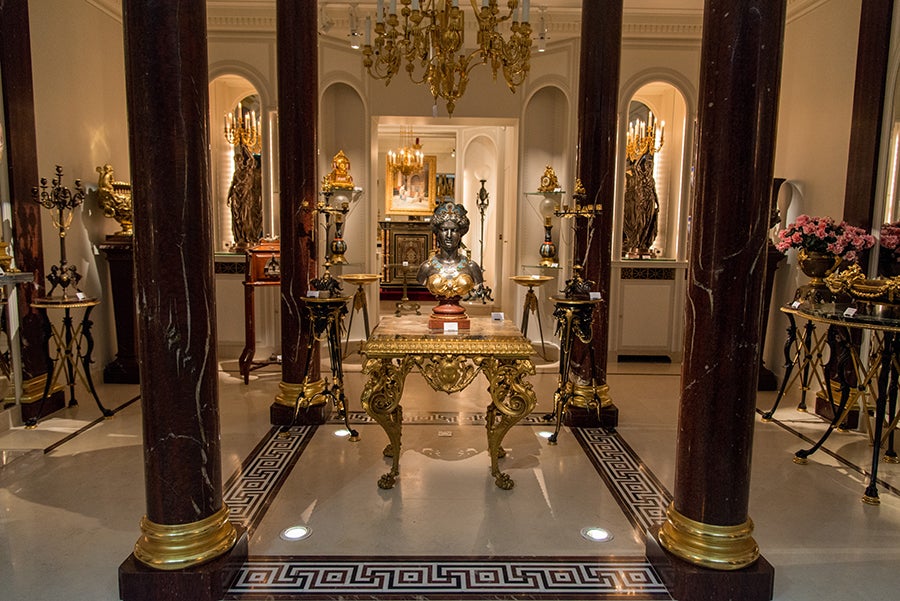
About the Seller
4.9
Gold Seller
Premium sellers maintaining a 4.3+ rating and 24-hour response times
Established in 1997
1stDibs seller since 2018
85 sales on 1stDibs
Typical response time: <1 hour
Associations
International Confederation of Art and Antique Dealers' Associations
- ShippingRetrieving quote...Shipping from: Saint Ouen, France
- Return Policy
Authenticity Guarantee
In the unlikely event there’s an issue with an item’s authenticity, contact us within 1 year for a full refund. DetailsMoney-Back Guarantee
If your item is not as described, is damaged in transit, or does not arrive, contact us within 7 days for a full refund. Details24-Hour Cancellation
You have a 24-hour grace period in which to reconsider your purchase, with no questions asked.Vetted Professional Sellers
Our world-class sellers must adhere to strict standards for service and quality, maintaining the integrity of our listings.Price-Match Guarantee
If you find that a seller listed the same item for a lower price elsewhere, we’ll match it.Trusted Global Delivery
Our best-in-class carrier network provides specialized shipping options worldwide, including custom delivery.More From This Seller
View AllRenaissance Style "Four Seasons" Cabinet by M. Lerolle, France, Circa 1890
By Lerolle
Located in PARIS, FR
Signed " Meubles D’Art, M. Lerolle, Fabricant, 61, Rue des Sts-Peres. Paris "
Remarkable carved wood cabinet, richly sculpted in the Neo-Renaissance style, and inlaid with vert de m...
Category
Antique 1890s French Renaissance Revival Cabinets
Materials
Marble
Renaissance Style Cabinet, France, Circa 1870
Located in PARIS, FR
An outstanding carved cabinet in the Renaissance style. The upper part consists in two stages with arcades, divided in six compartments by rich columns with Corinthian capitals, and topped by a carved entablature. The lower part opens with three doors, ornated with masks, hybrid figures and foliates, and relies on four strong feet.
This cabinet, probably executed for an amateur or a collector, is a perfect model for the neo-Renaissance style, that rose in the 1830’s, in France with the designers Claude-Aimé Chenavard (1798-1838) and Michel Liénard (1810-1870). It came some years after the Gothic Revival, but met a longer success during the 19th century (at the Expositions des Produits de l’industrie in 1844 and 1849, and at the Universal Exhibitions in 1855, 1867 and 1878). Inspiration was found in the French Renaissance, more specifically in the art of Henri II’s reign, and cabinet-makers used dark carved...
Category
Antique 1870s French Renaissance Cabinets
Materials
Wood
Neo-Greek Gueridon Attributed to F. Barbedienne, France, Circa 1880
By Ferdinand Barbedienne, Louis-Constant Sevin
Located in PARIS, FR
A similar model was exposed at the 1889 Paris Universal Exhibition ( see picture attached)
Patinated and gilded bronze gueridon with four paw feet joined by X-shaped stems, attributed to Sévin and Barbedienne. Round green marble top mounted with a bronze rim adorned with oves and pearls motif.
Born in 1821 and dead in Paris in 1888, Louis-Constant Sévin was apprenticed to the parisian sculptor Marneuf. In 1839, he joined the sculptor-modelors Phénix and Joyau, as designer, and designed silver-smith’s objects for famous firms like Denière, Froment-Meurice, Morel and Duponchel. During the Revolution in 1848, C. Sévin joined Morel in London, as workshop manager and designed pieces that Morel exhibited in 1851. Back in France in 1851, C. Sévin went to Limoges and designed models for the porcelain factories of Jouhanneaud and Dubois of which many pieces were exhibited at the Universal Exhibition in 1855. From this date on, he worked for Ferdinand Barbedienne as sculptor-ornemanist until the end of his life. Sévin’s works are considerable, he designed furniture bronzes for the « hôtel de La Païva ». At the London Exhibition in 1862, he was awarded a medal « pour l’excellence artistique des meubles qu’il a dessinés et qui sont exposés par Barbedienne » : for the artistic excellence of the furniture he designed and which is exhibited by F. Barbedienne. He won a second class medal at the Union centrale des Arts décoratifs Exhibition in 1863 and was awarded a gold medal as « cooperator ». F. Barbedienne said that posterity would remember Sévin’s compositions. The most extraordinary object designed by C. Sévin for F. Barbedienne, was a Renaissance style gilded bronze monumental clock...
Category
Antique 1880s French Greek Revival Center Tables
Materials
Marble, Bronze
Spectacular Louis XVI Style Center Table, France, circa 1880
Located in PARIS, FR
Beautiful ceremonial table in mahogany veneer, black stained wood and gilded bronze. The top with symmetrical decoration presents an important marquet...
Category
Antique 1880s French Neoclassical Tables
Materials
Bronze
Oriental Style Shelf, France, Circa 1890
Located in PARIS, FR
Charming Oriental style corner wall shelf in carved wood with moucharabieh decoration and mother-of-pearl pastilles on the edge of the shelf.
Category
Antique 1890s French Shelves and Wall Cabinets
Materials
Mother-of-Pearl, Wood
Important Louis XVI Style Commode by F. Linke, France, circa 1890
By François Linke
Located in PARIS, FR
Signed F. Linke
Important Louis XVI style commode with a central domed projection, in amaranth and satin veneer, with concave sides, and richly decorated with chiseled and gilded br...
Category
Antique 1890s French Louis XVI Commodes and Chests of Drawers
Materials
Marble, Bronze
You May Also Like
Center Table Desk Renaissance Style
Located in Vienna, AT
2nd half of the 19th century, solid hardwood, stained black, rectangular top decorated with bevelled corners , turned legs in baluster form, signs of age and use, some restoration wo...
Category
Antique 1880s Swedish Renaissance Center Tables
Materials
Hardwood
Circa 1880 Italian Walnut and Maple Renaissance Style Center Table, Todi, Umbria
Located in Dallas, TX
An amazing piece of Italian furniture dating to circa 1880, this Renaissance-style center table has been hand-carved in walnut and maple woods in Todi (a town within the region of Um...
Category
Antique Late 19th Century Italian Renaissance Center Tables
Materials
Wood, Maple, Walnut
Italian 19th Century Renaissance Style Giltwood Center Table
Located in West Palm Beach, FL
An impressive and most handsome Italian 19th century Renaissance st. giltwood and faux painted marble center table. The rectangular table is raised by beautiful palmette designed fee...
Category
Antique 19th Century Italian Renaissance Center Tables
Materials
Giltwood
Spanish Renaissance Style Walnut Center Table
Located in Queens, NY
Antique Spanish Renaissance style (18/19th Century) walnut rectangular center table with plank top and double iron stretcher.
Category
Antique 19th Century Spanish Renaissance Revival Center Tables
Center table, Northern Europe, circa 1890.
Located in Chorzów, PL
Center or coffe table from Northern Europe, circa 1890.
Very good condition, after professional renovation.
dimensions: height 66 cm length 110 cm depth 82 cm
Category
Antique 1890s Swedish Biedermeier Center Tables
Materials
Walnut
Italian Late 16th Century Renaissance Walnut Center or Library Table
Located in Troy, NY
Extraordinary, large Italian Renaissance table of strong, linear design. The thick 2-plank top with a narrow dentil edge, above a frieze cont...
Category
Antique 16th Century Italian Renaissance Center Tables
Materials
Walnut
